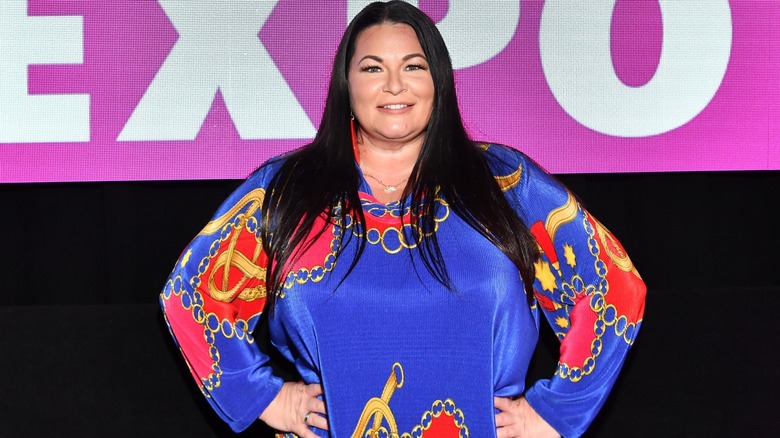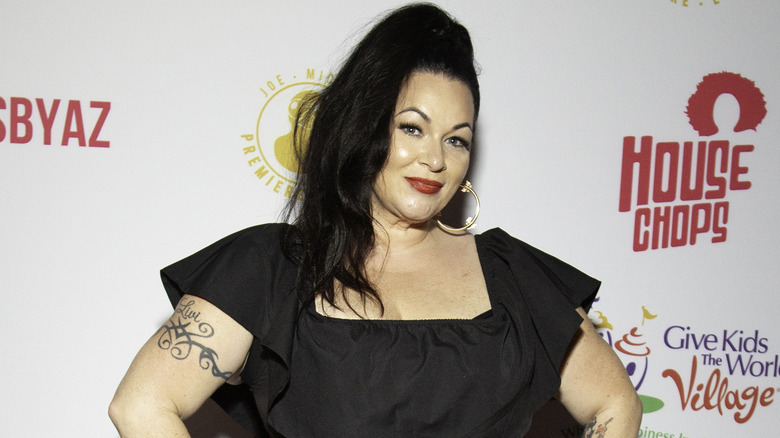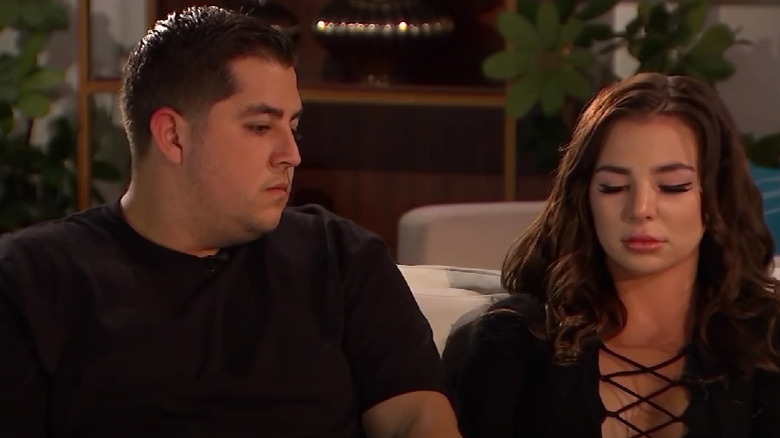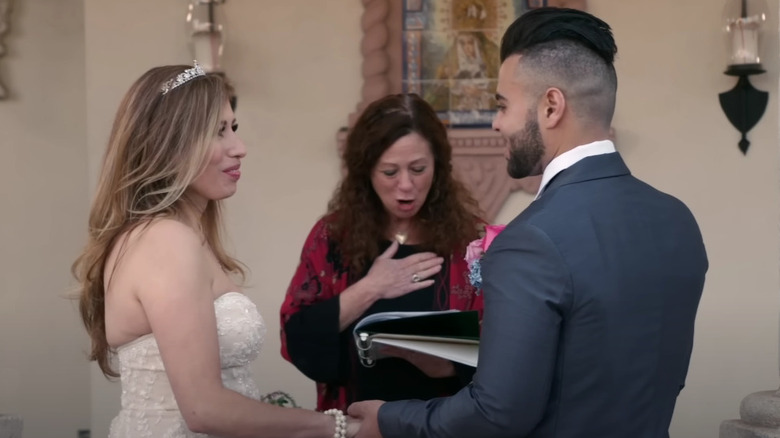90 Day Fiancé: What Happens When The Stars Get Divorced?
The following article contains mentions of domestic abuse and violence.
"90 Day Fiancé" is supposed to be a show about love, but anyone who has seen the show knows that it tends to be much more than that. "90 Day Fiancé" certainly showcases love stories, but it also sometimes documents the unraveling of those same romances. While we don't always see divorce play out on-screen, several "90 Day" couples have ended their marriages. When Season 1 couple Anfisa Arkhipchenko and Jorge Nava divorced following Jorge's arrest in 2018, many viewers wondered what Anfisa's future looked like. Would she be deported? Would she be able to find a new life in the United States? Spoiler alert: she's now a naturalized U.S. citizen. And when Season 2's Danielle Mullins and Mohamed Jbali called it quits, fans were shocked to see that Mohamed stayed in the United States, despite Danielle's attempts to get him deported.
We all know that divorce can be a fraught and messy experience, but when you get divorced in a country where you're living on a spousal visa, a split can get a whole lot messier.
It depends on the reason for divorce
What happens to "90 Day Fiancé" stars after their relationship ends isn't always clear-cut. In the case of Colt Johnson and Larissa Dos Santos Lima, who are a very memorable couple from Season 6, a divorce lawyer told E! News that if Larissa, who is originally from Brazil, "can show that she is a victim of domestic violence, then she can self-petition for a green car stating that she a victim of violence under the VAWA (Violence Against Women Act) act and she can then get a green card herself without having the sponsorship of Colt."
Often, one of the most salient ways a non-native spouse can stay in the United States and get a green card following a divorce is if their ex-spouse agrees to financially sponsor them. As you can imagine, this doesn't happen super frequently, since divorces are often fraught and don't always end on friendly terms.
However, as in Larissa's case, "90 Day Fiancé" stars who can prove that abuse from their spouse was the reason for their divorce can self-petition a green card, allowing them to stay in the United States without being sponsored by their ex-spouse. Obviously, it's not an ideal circumstance, but abuse allegations have happened with other "90 Day" stars — in 2023, Yve Arellano was charged with domestic assault and battery against Mohamed Abdelhamed, but Yve's rep denied that she committed any abuse toward Mohamed, per In Touch.
Deportation is possible
While the international "90 Day Fiancé" stars who are victims of abuse may be able to stay in the United States post-divorce, the international cast members who carry out the abuse are at risk of deportation. Larissa Dos Santos Lima accused her spouse, Colt Johnson, of domestic abuse but was also accused of domestic abuse herself after Colt called the police on her multiple times, alleging domestic violence and presenting injuries from Larissa, per E! News. In these cases, where both parties have gotten violent at some point, determining the aggressor of violence is key to moving forward with deportation or other legal action.
According to immigration attorney Edward Schulman, "If [Larissa] is deemed to be the one who is the aggressor who gets convicted of domestic violence she could be placed in deportation proceedings and possibly deported from the United States" (via E! News). Determining the aggressor can be done by providing proof in the form of photos, videos, texts, calls, and witnesses of abuse. Fortunately for Larissa, her arrest record was wiped clean after six months of community service, and she obtained a green card without Colt's financial sponsorship.
Deportation is also a possibility for other reasons. Season 5's Luis Mendez, who married Molly Hopkins, faced deportation post-divorce – and some viewers believe it was because he used Molly as a way to get to the United States.
Ex-partners can continue to financially support their ex, allowing them to get a green card
If an American and non-American couple divorced after less than two years of marriage, it could jeopardize the international spouse's immigration status. However, if a couple decides to divorce, but end their relationship on friendly terms, the American spouse can opt to financially sponsor their international ex-spouse so they can eventually get a green card. According to Justia, financially supporting a foreign partner post-divorce is not out of the ordinary — and can even be required by law, depending on the circumstances.
According to immigration attorney Edward Schulman, "If the first spouse is still willing to issue an affidavit of support, which is saying that they are willing to monetarily support them, then they can still get a green card either through that spouse or through a different mechanism (via E! News). So, securing permanent residency in the United States after a less-than-two-year marriage is possible if both exes remain amicable.
It depends on when the couple gets divorced
When couples get married, the foreign spouse exchanges their K1 "fiancé visa" for a CR1 spousal visa, which government officials check on after two years to ensure the couple is married for genuine reasons rather than for immigration purposes.
If the couple divorces before two years, the CR1 visa becomes invalid and the foreign partner may face deportation. Individuals who stay married for two years or more can then apply for a marriage green card and, if all goes well, become lawful permanent residents. If the couple divorces after that two-year period, the international spouse will have to go through a process to remove limitations from their CR1 visa. Then, they can apply for the IR1 visa, which lasts 10 years before requiring renewal.
Some may wonder if people take advantage of the CR1 visa by getting married to someone they aren't actually interested in, and then faking the marriage until they can secure the IR1 visa. Fans of the show have speculated that Season 4 of "90 Day Fiancé: The Other Way" star Oussama Berber was using Debbie Aguero, an American nearly 50 years his senior, for a green card. Many fans also believed Season 1's Mohamed Jbali married Danielle Mullins for a green card. Whether or not Oussama and Mohamed were, in fact, scamming their partners, the good news is that neither couple is together these days, so no one has to question the validity of their relationships.
They can stay in the U.S. through a U visa
Some individuals on "90 Day Fiancé" may be able to stay in the U.S. post-divorce by receiving a U visa. According to UpCounsel, a U visa is issued when someone visiting the U.S. is the victim of a serious crime. If the victim is willing to help police solve the crime, they are granted a U visa, which allows them to stay in the U.S. for up to four years. In special cases, this four-year period may be extended. After three years of holding a U visa, individuals are able to apply for a green card, making them legal residents.
Though it's unclear if a "90 Day Fiancé" star has been granted a U visa, some believe Mohamed Abdelhamed made up domestic violence allegations against his ex-wife Yve Arellano so that he could work with police to obtain a U visa and eventually get a green card (per Entertainment Tonight). According to a rep for Dominton Talent House, who spoke with Entertainment Tonight on Yve's behalf, "Mohamed ... created these false accusations so that just in case Yve wasn't going to stick around he would have a backup plan which was the U visa. That way, he would stay in the U.S. and not get deported. There is no proof of Mohamed's domestic violence allegations against Yve. ... There is footage from Yve's home that night, and there isn't really anything that came of it."
Different visas carry different conditions
Different visas allow individuals different periods of time when they are legally allowed to be in the United States. The CR1 visa allows people to stay in the United States on a temporary basis for the first two years of their marriage; after that two-year period, foreign individuals can apply for the IR1 visa, which is valid for 10 years. Most people on "90-Day Fiancé" who move to the United States utilize the K1 visa, which holds the same requirements as the CR1 visa, except the K1 visa does not allow the international spouse to work until they receive their marriage green card.
It's possible that "90 Day Fiancé" Season 2 alum Yamir Castillo, who is a musician and talked on the show about his aspirations to live in Chicago to advance his music career, has been able to stay in the United States due to his visa. Because the couple stayed married for two years before Chelsea Macek and Yamir Castillo broke up in 2016, he may have been able to secure a 10-year IR1 visa. The same goes for Season 4 couple Pedro Jimeno and Chantel Everett, who divorced in 2022. Because they were married for longer than that two-year period, Pedro likely had no problem securing a long-term visa.
Annulment of a marriage often leads to deportation, while divorce does not
When a marriage is annulled — in other words, made invalid, as though it never happened — international partners no longer receive any of the benefits of a marriage visa. However, when a couple with an international spouse divorces, there is a possibility that the international spouse can legally stay in the United States after divorcing.
This may have been why Season 1 alum Mohamed Jbali convinced his then-wife, Danielle Mullins, to divorce him rather than annul their marriage. The two divorced in 2017 after three years of marriage – but Danielle first tried very hard to annul their marriage in 2016 (per Us Weekly). In "90 Day Fiancé: Happily Ever After?" viewers saw Danielle wanting to annul the marriage on the grounds of fraud, but her court liaison, Linda, explained that fraud is hard to prove. Even though Mohamed seemingly did not become involved with Danielle for genuine reasons, there just wasn't enough proof to grant an annulment.
Opting for a divorce allowed the couple to end their relationship once and for all, and it also gave Mohamed the opportunity to obtain the 10-year IR1 visa. And though this couple went through plenty of ups and downs in their relationship, we're happy to report that, these days, Danielle and Mohamed have transitioned into a supportive friendship post-divorce. "I think that we're better off as friends. We're very supportive of each other," Danielle told Us Weekly in 2021.
If you or someone you know is dealing with domestic abuse, you can call the National Domestic Violence Hotline at 1−800−799−7233. You can also find more information, resources, and support at their website.







